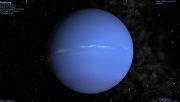Planetary Database/Terran/Neptune
The Planetary Database - Terran System - Neptune
Neptune is the outermost gas giant in our solar system. For most of its 165 year orbit it is the eighth planet from the Sun and occasionally the ninth due to Pluto's eccentricity. It is the fourth largest planet by diameter and the third largest by mass; Neptune is more massive than its near twin Uranus as its stronger gravitational field has compressed it to a higher density. The planet is named after the Roman god of the sea. Its astronomical symbol is a stylized version of the god's trident. (♆)
Neptune's atmosphere is primarily composed of hydrogen and helium, with traces of methane that account for the planet's blue appearance. Neptune's blue colour is much more vivid than that of Uranus, which has a similar amount of methane, and an unknown component is presumed to cause the intense color. Neptune also has the strongest winds of any planet in the solar system, with estimates as high as 2,500 km/h. At the time of the 1989 Voyager 2 flyby, it had in its southern hemisphere a Great Dark Spot comparable to the Great Red Spot on Jupiter.
Characteristics
At 1.0243×1026 kg Neptune is an intermediate body between Earth and the largest gas giants: it is seventeen Earth masses but just 1/18th the mass of Jupiter. It and Uranus are often considered a sub-class of gas giant termed "ice giants", given their smaller size and important differences in composition relative to Jupiter and Saturn. In the search for extra-solar planets Neptune has been used as a metonym: discovered bodies of similar mass are often referred to as "Neptunes" just as astronomers refer to various extra-solar "Jupiters."
